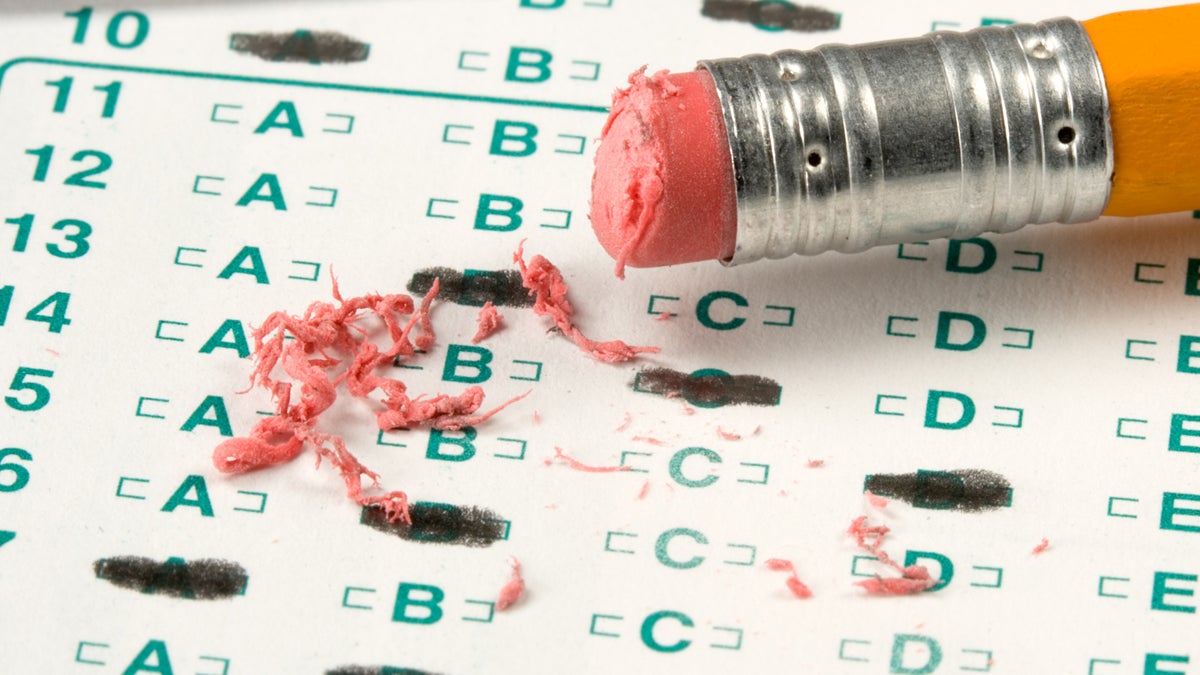Pa. school leaders brace for impact of state test declines on parents, students, teachers
Listen
(Photo via ShutterStock)
Educators across the state are reeling now that they have learned how much scores have plummeted in their individual schools.
Last month, WHYY/Newsworks reported that scores on state standardized tests have dropped precipitously based on the implementation of more rigorous tests.
Educators across the state are reeling now that they have learned how much scores have plummeted in their individual schools.
Elementary and middle-school principals in Philadelphia are reporting 10 to 20 percentage point drops on the English language arts exam and 30 to 40 percentage point drops on the Math exam.
The 2014-15 school year was the first in which PSSA tests – taken in grades three through eight – were aligned with Pennsylvania’s version of the Common Core state standards.
For that reason, officials from the Pennsylvania Department of Education say it is misleading to compare student proficiency rates to prior years; 2014-15 should be considered the “new baseline,” the department said.
Despite that advisory, principals and administrators are bracing for how the news will affect parents, students and teachers.
“My concern is really messaging it to my teachers because my teachers worked so hard last year,” said Anh Brown, principal of Nebinger Elementary in South Philadelphia. “They worked really, really hard.”
Preliminary scores at Nebinger show a 40 percentage-point drop in math and a 20 percentage-point decline in English language arts.
“We knew it was going to go down, but we didn’t know by how much,” she said.
Eileen Hoffman, principal of Shawmont elementary in Upper Roxborough, also said scores dropped by 20 percentage points in English and more than 40 percentage points in math.
“It’s going to be a very difficult conversation,” said Hoffman. “We have to change our instructional practices and improve instruction for our kids … It’s a culture shift.”
Logan elementary school principal Chuanika Sanders-Thomas said her school’s proficiency rate in math dropped from 50 percent to 16 percent.
“We’re going to cry for a moment, but we’re going to dust ourselves off and help the kids learn more this year,” said Sanders-Thomas. “We have to talk to parents about how times have changed. It’s not like it was when you were in school. The expectations have changed. So we need you to get on board.”
On the bright side, Logan’s English language arts score held steady.
“At least I get to have the positive to go along with the bad news,” said Sanders-Thomas.
Another elementary school principal speaking anonymously blamed the drops on insufficient teacher training. Only a small core of her teachers was motivated to change methods, she said.
“One of my biggest problems is not having teachers trained to teach in a way that meets the standards of the new PSSA,” the principal said. “This is a big wake-up call for us. We can’t keep doing the same things.”
Across the state, proficiency rates are especially low in seventh- and eighth-grade math. Based on preliminary results, the state anticipates that only 30 percent of eighth-graders will be considered proficient.
Other Philadelphia school administrators, district and charter, expressed additional concerns about implications of the test results.
One called into account the validity of the assessment, noting that student results didn’t correspond to classroom instructional quality. In the example given, the administrator said students taught by one of the school’s stronger teachers fared worse than those with a weaker teacher.
Another found that comparing PSSA results to internal measures showed the math test is significantly more difficult than the literacy test. This administrator was frustrated that the state hasn’t better explained how the levels of difficulty were determined.
Official messaging
Many districts and charter schools across the state have sent letters to parents and teachers explaining the reason for the declines.
“We want you to understand that these scores are not true reflections of your child’s success. The playing field has changed across the state with a very short time for adjustment. Based on their report, it seems as though these results are going to be reflected across the PA Commonwealth,” wrote John Swoyer, CEO of MaST charter school in Far Northeast Philadelphia, in a letter to parents.
Swoyer declined to release his school’s preliminary scores. MaST has routinely scored among the top public schools in Philadelphia on state tests. He hopes the letter gives parents “peace of mind” that children are “getting the same education that they had in the past.”
The Philadelphia School District said it will send out a letter to parents, teachers and staffers on Thursday explaining that “declines in students’ performance levels on the new PSSAs do not indicate that students are learning less.”
In an interview Wednesday, district superintendent William Hite stressed the declines do not reflect poorly on the district, and merely mirror the statewide trend.
“I said to the principals, look, everybody just calm down. This is not a surprise to anyone because these are different standards that are more rigorous and it’s the first time,” Hite said. “Given that, let’s not all jump into a year-to-year comparison because that’s not appropriate.”
Hite said the district’s PSSA math scores actually fell less sharply than the state average.
The district’s letter also addresses a concern among parents fearful that declining scores will hamper their child’s chances of acceptance to specialty admission programs.
“We plan to review and make any needed adjustments to our high school admission standards – which already take into account a range of factors and performance over time – to ensure that the move to new, more rigorous PSSA tests does not limit students’ access to opportunity,” the letter reads.
The letter adds: “We will continue to seek the needed funding to ensure that all of our students are prepared to meet the most current expectations of colleges and employers.”
The district’s high schools did not see drops on the Keystone state assessment, which had already been aligned to the more rigorous standards.
Hite said, districtwide, small gains were made in biology; scores stayed flat in Algebra, and a 7 percentage-point gain was seen in literature.
The Philadelphia Public School Notebook’s Fabiola Cineas contributed to this report.
WHYY is your source for fact-based, in-depth journalism and information. As a nonprofit organization, we rely on financial support from readers like you. Please give today.





